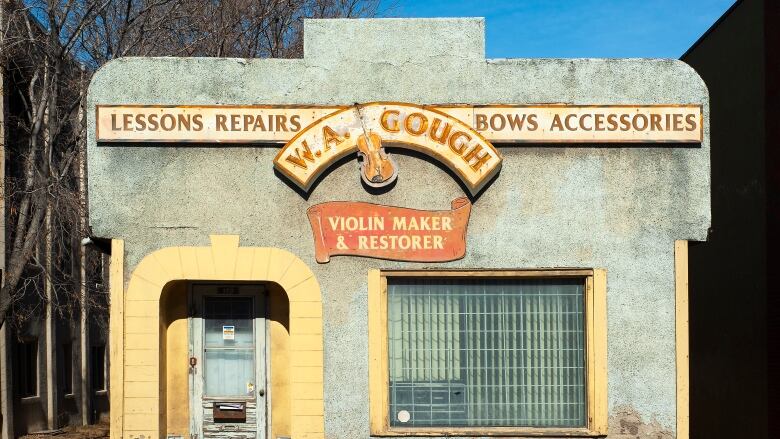Demolition of iconic Calgary violin store 'diminishes the richness of city life'
W.A. Gough violin store on 16th Avenue N.W. was more than a century old

Though it called 16th Avenue N.W.home for more than a century, a building home to a distinctive violin store was expeditiously demolished Saturday.
The distinctive facade of the W.A. Gough violin store made it a favourite of many frequenters of the avenue, even though it had not been open for business for years.
The shop's owner, Al Gough, died in 2013, but was a well-respected violin maker and restorer in the community.
Though Saturday's events didn't marka significant historicalloss, Calgary historian Harry Sanders said the building's demolition diminishes the richness of city life.
"Along 16th Avenue, that building stands out ...there are people who still remember that business and Mr. Gough," he said. "But also just how it adds to the richness of city life by giving ustemporal dimension. When you drive along 16th Avenue, there's not much there that tells you that street was there over 100 years ago.
"That building does. Or it did, until yesterday."
A different era
The building itself dates back to 1912, originally opening as a plumbing operation called Anderson & Dick plumbers.
Sanders said the building also played host to a number of other businesses prior to becoming a violin store, including a branch of a well-known drycleaning shop named Dollar Cleaners & Dyers.

Sanders said the building's constancy reminded us of a Calgary froma different era, as the building was constructed shortly after the annexation of the village of CrescentHeights.
"It's part of a phenomenon. It reminds us of 1912 Calgary, early development on an early commercial street in a distant subdivision in Calgary," he said. "Even though it post-dates the annexation of the village of Crescent Heights, it's a reminder to us of how old that area is within the city, and a reminder of what it might have been like in the time of the village of Crescent Heights."
Music memories
Manyvoiced their dismay at the loss of the building, including Jeff White, a Calgary native and double bassist.
A former member of the Calgary Philharmonic, White has lived in Denmark for seven years. He recalled the shop as being tiny, with a counter in the middle surrounded by violins and a workshop in the back.
As a young musician, White received a yearly scholarship from Goughfrom age eight until he left Calgary at age 16 the only scholarshipavailable for bass players in the Kiwanis Musical Festival at the time.
"Realizing he made a little point of making sure us lowly bass players had help, is pretty meaningful to me, actually," White said.
The demolition also provoked strong reactions on social media, including from Andrew Chomik.
I got my first violin there as a child, I loved going in there, you could smell violins and the love that went into them. This building gives me the feels everytime I drive by it, a truly iconic building in Calgary and a memory in time. #yyc
—@AtomicologyArchitectural heritage
Calgary photographerGeorge Webber said he had photographed the building a dozen or more times over the years.
"My little practice has been to record the vanishing architectural heritage of the city and I've been doing that for many years," he said. "I'm just fighting my own little personal battle against the relentless forces of time."
Webber said despite its recent state of disrepair, the loss of the W.A. Gough violin store could diminish a sense of community and history in the area.
"[Buildings like that] really humanize and warmthe street. It gives the street a sense of history and identity and connection to the community, to the people that would have their instruments repaired there," he said. "We sometimes [have] those very kind of individual, idiosyncratic, almost folk art independent businesses.
"That building is likely to be replaced with something which is much more chic and modern and utilitarian."
CBC was not able to confirm with the city whether or not the building's sign W.A. Gough Violin Maker & Restorer was preserved.
Too late. Its gone. Fitting end of a horrible week. pic.twitter.com/VXoqRdnDFZ
—@ritasirignano











_(720p).jpg)


 OFFICIAL HD MUSIC VIDEO.jpg)
.jpg)



























































































